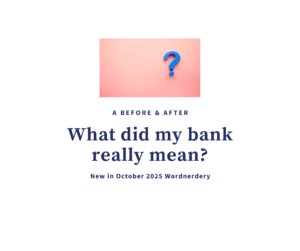 My bank tried to call me three times while I was on vacation earlier this month, about reviewing the profile of my business account.
My bank tried to call me three times while I was on vacation earlier this month, about reviewing the profile of my business account.
They had already emailed me a few times to ask me to update my profile – IF anything had changed with my account or my business. Nothing had changed, so I ignored the emails and the phone calls.
Once home, I couldn’t reach anyone at the bank’s toll-free number. So I trotted off to my local branch. The bank rep took one look at my bank card and said, “I know what’s wrong. Your card has expired.”
Oddly enough, there was no expiration date on the card. And the earlier emails had said something completely different.
In my October newsletter, I look at what the bank said and what they should have said to inspire action, not confusion. Going back to the principles of plain language, they should have focused first on what their customers need or want to know and why it’s important to them. The desired result would mean customers quickly and easily:
- Find what they need
- Understand what they find
- Act appropriately on that understanding.
My rewrite focused on the real reason the bank wanted me to call, specifically pulling out “this will affect you.” See what you think of the before & after in October Wordnerdery.
Have you seen a “before” piece of writing that needs an “after”? Please share! I’m always looking for good (bad) examples.
Related reading:
Editors Canada explains plain language
Even lawyers prefer plain language (really!)
